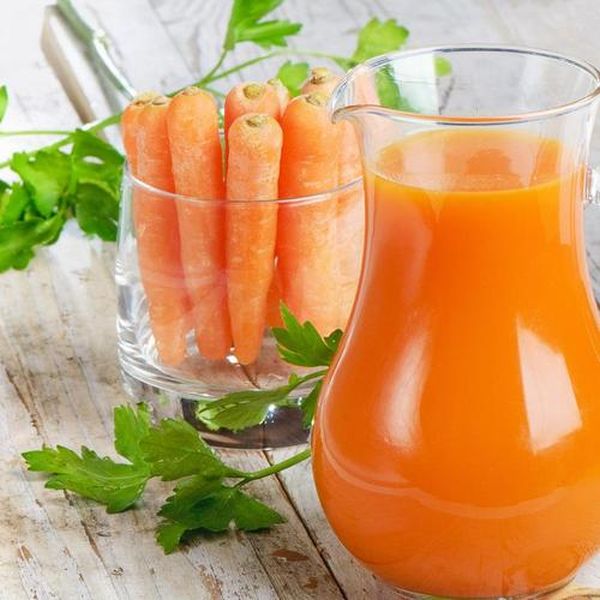Beta carotene, named after the Latin word for carrot, is a member of the family of natural chemicals such as beta carotene or carotenoids. It is abundant in plants, giving fruits and vegetables a plump yellow and orange colour.
Beta carotene (C40H56) is one of the carotenoids, is an orange fat soluble compound, it is the most common and most stable natural pigment in nature. Purplish red to dark red crystalline powder, slightly peculiar odor. The dilute solution of beta-carotene was orange yellow, easily soluble in dichloromethane, chloroform, carbon disulfide and other organic solvents. The solution is orange when the concentration increases, but a little red because of the polarity of the solvent. Unstable in contact with oxygen, heat and light. It’s more stable in a weak base.
The most abundant sources of beta-carotene are green leafy vegetables and yellow or orange fruits such as carrots, spinach, lettuce, potatoes, sweet potatoes, broccoli, cantaloupe and so on. Beta-carotene is fat-soluble and its fortification is usually in capsule and gelatinous form.
Beta carotene is widely used in food industry, feed industry, medicine and cosmetics industry. At present, the methods used to obtain beta-carotene are natural extraction, chemical synthesis and microbial fermentation.
Beta-carotene, after ingestion of human digestive organs, can be converted into vitamin A, is the current safer vitamin A supplement products (only supplement chemical synthesis of vitamin A, excessive will make people toxic). It can maintain the health of the eyes and skin, improve night blindness, rough skin conditions, and help protect the body from free radicals.
In 1919, Steenkbock discovered that beta-carotene may have vitamin A activity. In 1928, it was found that one-molecule beta-carotene can be converted into two-molecule vitamin A under the action of enzymes in the body, and it is the most abundant in food, so it is considered to be the main source of vitamin A in the body. Moore (1929) found through experiments that supplementation with beta-carotene could significantly increase the level of VA in rats deficient in VA, thus confirming that beta-carotene could be converted into vitamin A under the action of enzymes in the body and play the role of vitamin A, so it is also known as provitamin A. This invertase can convert beta-carotene into VA when VA is deficient in the body, and when VA in the body increases to the required amount, the enzyme stops the transformation, so as to maintain the demand of VA in the body through automatic control of the enzyme. Beta-carotene accounts for 60-70% of the va60-70% the body needs worldwide, especially in developing countries. In addition, VA is the carrier of glycoprotein synthesis. Glycoprotein is an important structural material of cells, especially epithelial cells. If there is a lack of glycoprotein, it will affect the eyes, respiratory tract, digestive tract, urinary tract and reproductive organs. Immunoglobulin is also a glycoprotein, and VA deficiency will affect the formation of antibodies. Therefore, VA plays an important role in ensuring normal growth and development and fighting infection.
The antioxidant activity of beta carotene is mainly manifested in its ability to scavenge free radicals. Beta carotene molecules contain a number of double bonds, in the presence of light, heat, oxygen and more active free radical ions, easy to be oxidized, so as to protect the body is not destroyed. There are a lot of lipid peroxidation and free radical reactions in organisms, which lead to the decline of cell function, the aging of the body and the occurrence of diseases. The presence of beta carotene can reduce lipid peroxidation. Therefore, the activity of carotenoids in scavenging free radicals and quenching singlet oxygen has been widely concerned.
Beta-carotene only works when other important antioxidants, such as vitamins C and E, are included in the diet. Heavy smokers or drinkers should be careful about taking beta-carotene, which can increase their risk of heart disease and cancer.
Conventional wisdom holds that supplementation with beta carotene can not only reduce the incidence of cardiovascular disease and cataract, but also prevent cancer. But a number of tests in recent years have found that the group taking beta carotene had a 28% higher risk of lung cancer than the control group.
Nutritionist analysis: supplement physiological dose (5 mg/day) of carotene has an anti-cancer effect, and intake of excessive carotene will prevent vitamin A and the corresponding receptor binding, and prevent the transformation of tumor suppressor genes, the result is not anti-cancer but to the opposite side.
But it’s important to note that a healthy, well-balanced, nutrient-rich diet is more effective than supplementing with b-carotene alone. Do not take it with vinegar or other acidic substances.
Post time: Apr-17-2020
